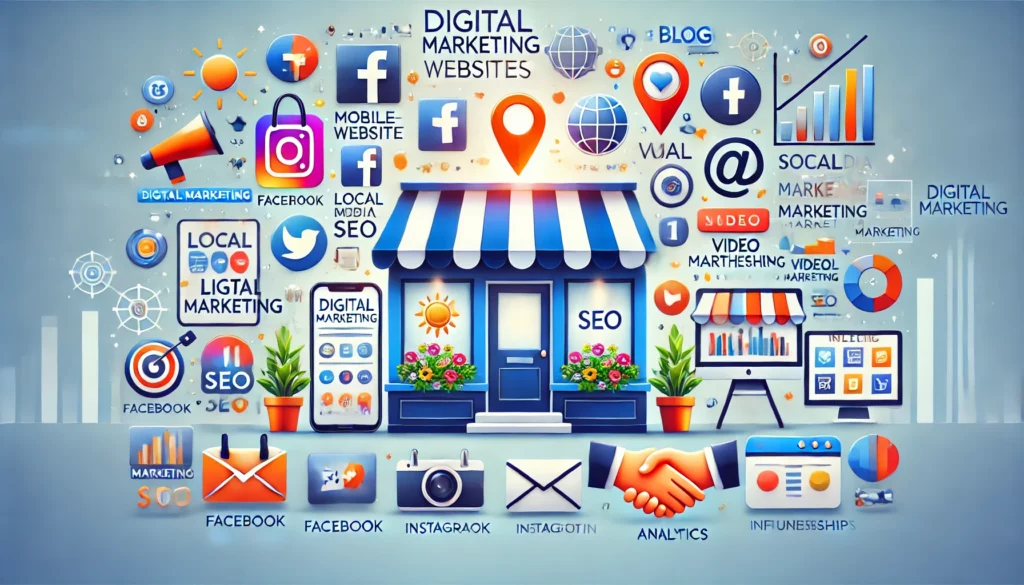10 Essential Digital Marketing Strategies Every Small Business Should Know
Introduction
In today’s digital-first world, small businesses cannot afford to overlook the importance of a strong online presence. But where should you start? This blog outlines 10 essential digital marketing strategies tailored for small businesses. Each strategy is actionable, affordable, and proven to drive results.
What You’ll Learn
- How to build a mobile-friendly website.
- The importance of local SEO for small businesses.
- Proven techniques for social media, PPC, and email marketing.
- Tools and resources to simplify implementation.
By the end of this post, you’ll have a roadmap to elevate your business online.
- Build a Mobile-Friendly Website
Your website serves as the digital storefront for your business. It must be mobile-friendly to cater to today’s users.
Why It Matters
According to Statista, over 54% of global website traffic comes from mobile devices. A clunky or slow-loading website drives users away, harming your credibility.
How to Do It
- Choose Responsive Design:Use website builders like WordPress or Squarespace that offer mobile-optimized templates.
- Optimize for Speed:Compress images using tools like TinyPNG and implement lazy loading for faster page loads.
- Streamline Navigation:Keep menus simple, and ensure CTAs like “Contact Us” or “Get a Quote” are prominent.
- Test Across Devices:Use tools like Google’s Mobile-Friendly Test to ensure your site performs well on smartphones and tablets.
- Optimize for Local SEO
Local SEO ensures your business shows up when people search for services in your area.
Why It Matters
A study by BrightLocal found that 76% of people who search for local businesses visit a store within 24 hours. If you’re not visible on search engines, you’re missing out on local customers.
How to Do It
- Claim Your Google Business Profile:Visit Google Business Profile to list your business and optimize it with accurate details, photos, and customer reviews.
- Use Local Keywords:Integrate terms like “best coffee shop in [your city]” into your website content and meta descriptions. Use SEMrush for keyword research.
- Build Citations:List your business in local directories like Yelp, Bing Places, and TripAdvisor.
- Encourage Reviews:Ask satisfied customers to leave reviews on Google, Yelp, or Facebook to boost credibility.
- Leverage Social Media Marketing
Social media platforms are free or low-cost ways to build brand awareness and engage with your audience.
Why It Matters
Platforms like Facebook, Instagram, and TikTok have billions of active users daily. Posting consistent, valuable content can help your business gain followers and convert them into loyal customers.
How to Do It
- Choose the Right Platform:Use Instagram for product visuals, Facebook for community interaction, and TikTok for trending video content.
- Schedule Content:Tools like Buffer or Hootsuite can help you plan posts in advance.
- Engage Regularly:Reply to comments and messages promptly to build a relationship with your audience.
- Invest in Pay-Per-Click (PPC) Advertising
PPC campaigns offer immediate visibility and lead generation for small businesses.
Why It Matters
Organic growth takes time, but PPC advertising can drive traffic to your website quickly. For example, Google Ads allows you to target customers searching for your specific product or service.
How to Do It
- Define Your Goals:Whether it’s generating leads or promoting a sale, set clear objectives.
- Target Specific Keywords:Use Google Keyword Planner to identify high-intent keywords relevant to your business.
- Monitor ROI:Use Google Analytics to track the performance of your ads and adjust budgets accordingly.
- Build an Email Marketing List
Email marketing delivers one of the highest returns on investment (ROI) among digital strategies.
Why It Matters
For every dollar spent on email marketing, businesses can see an average return of $36 (Litmus).
How to Do It
- Collect Emails:Offer incentives like discounts or free resources to encourage sign-ups.
- Segment Your Audience:Group subscribers by location, preferences, or behavior.
- Automate Campaigns:Use tools like Mailchimp or HubSpot to automate welcome emails, reminders, and promotions.
- Create High-Quality Content
Content is king in the digital marketing world. Providing valuable content helps attract and retain customers.
Why It Matters
Well-written blogs, videos, and infographics can improve your website’s SEO ranking and establish you as an authority in your industry.
How to Do It
- Start a Blog:Share tips, guides, or case studies relevant to your audience. Use tools like Grammarly to ensure your writing is clear and error-free.
- Repurpose Content:Turn blogs into videos, infographics, or podcast episodes to reach different audiences.
- Embrace Video Marketing
Videos are among the most engaging content formats, outperforming text and images on platforms like Instagram and TikTok.
How to Do It
- Create Tutorials:Use videos to demonstrate your product or services.
- Use Affordable Tools:Platforms like Canva and CapCut make video editing accessible to beginners.
- Focus on Analytics and Tracking
Data is critical for refining your marketing efforts and understanding your audience.
Why It Matters
Analytics tools help you identify which strategies are working and which need improvement.
How to Do It
- Use Google Analytics:Track visitor behavior, traffic sources, and conversions.
- Track Campaign Performance:Tools like Constant Contact can help you monitor email open rates and clicks.
- Partner with Influencers
Influencers have built trust with their followers and can help you reach new audiences.
How to Do It
- Start Small:Collaborate with micro-influencers in your niche.
- Find Partners:Use tools like Upfluence to identify suitable influencers.
- Stay Updated on Trends
Digital marketing trends change rapidly. Staying informed is key to maintaining a competitive edge.
How to Do It
- Follow Industry Blogs:Keep up with experts like Neil Patel or HubSpot.
- Enroll in Courses:Platforms like Coursera offer affordable, high-quality digital marketing courses.
Conclusion
By implementing these strategies, your small business can effectively compete in the digital landscape. Need personalized guidance? Book a consultation today!
